Calm, cozy and atmospheric cities of Belgium never cease to amaze and delight tourists. Ghent is no exception - the charming capital of Flanders has retained its medieval charm and a very special spirit. It is a city of majestic Gothic cathedrals and picturesque houses of wealthy merchant guilds, who seem to strive to outdo each other in the elegance of their façades.
Ghent early became the commercial and industrial center of Flanders. For many centuries now, human rights and freedoms have been respected here, traditions have been honored and the future has been built with dignity. In summer, the city is full of flowers, which is especially pleasant for tourists. Once every few years, a grandiose flower festival is held in Ghent, which attracts half of Europe.
What to see and where to go in Ghent?
The most interesting and beautiful places for walking. Photos and a short description.
- Friday Market Square
- Ghent Town Hall
- Ghent Post Office
- Befroy Tower
- Castle of the Counts of Flanders
- Castle of Gerard the Devil
- Cathedral of Saint Bavo
- Church of St. Nicholas
- Church and Bridge of Saint Michael
- Museum of Fine Arts
- City Museum of Modern Art (S.M.A.K.)
- Museum of Industry, Labor and Textiles
- Complex of protective structures Works
- Ghent-Sint-Peters station
- Herb Street and Grain Street
Friday Market Square
One of the oldest squares in Ghent, which has witnessed many historical events: conflicts of trade guilds, executions and coronations. The weekly Friday market has been gathering here since the end of the 12th century; this event has long turned into an unshakable tradition. The square is surrounded by buildings of the 15th-19th centuries, in the center there is a monument dedicated to Jacob van Arteveld, the leader of the anti-French uprising of the 14th century.
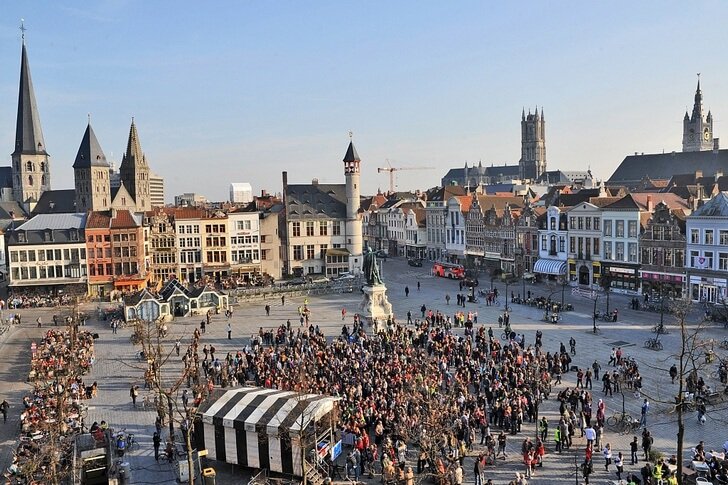
Address: Friday Market Square, Ghent, Belgium
Opening hours: 24/7
Ghent Town Hall
The city council building, which is a mixture of architectural styles. The facade is clearly divided into two parts belonging to different eras. Here you can find elements of Gothic, Flemish Renaissance, pseudo-Empire, Baroque. The town hall was erected in the first half of the 16th century on the site of the former home of one of the trade guilds. In the 19th century, several reconstructions were carried out, including the completely renovated interior.
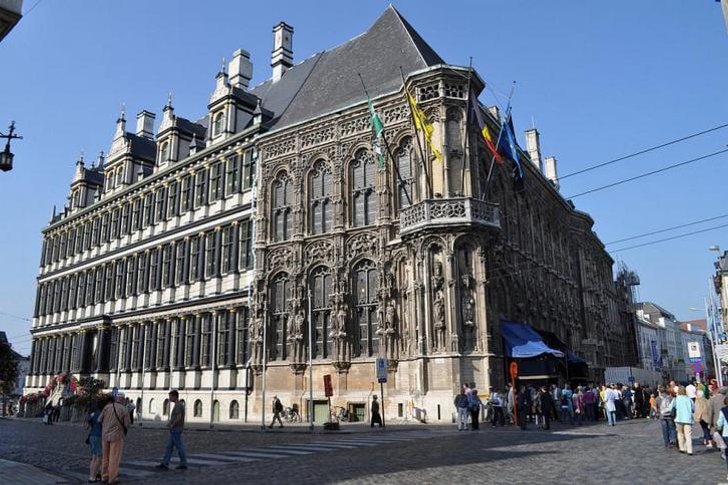
Address: City Hall, Ghent, Belgium
Phone: +32 9 266 80 00
Opening hours: 09:00 - 17:00
Ghent Post Office
An architectural monument of the late 19th - early 20th centuries, designed by L. Cloquet in the Neo-Renaissance and Neo-Gothic styles. The facade is decorated with symbolic statues that depict Belgium, Flanders and Wallonia. The smaller statues are the Belgian provinces. A traditional clock tower with a pointed spire rises above the post office building. The building currently houses a commercial center.
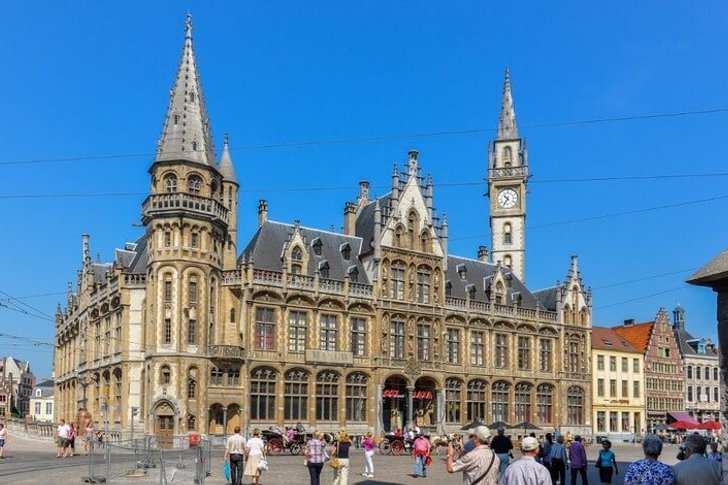
Address: Grote Wurth St, 16, Ghent, Belgium
Phone: +32 9 267 91 11
Opening hours: 09:00 - 17:00
Befroy Tower
In the distant Middle Ages, the tower performed an important function of warning the population in the event of enemy troops approaching the city walls, about the start of a fire or other disasters. In the event of such an event, a large alarm bell began to ring. The tower was erected in the XIV century, over time it has become a symbol of the freedom of the citizens of Ghent. At one time, a document on city privileges was kept in the tower.
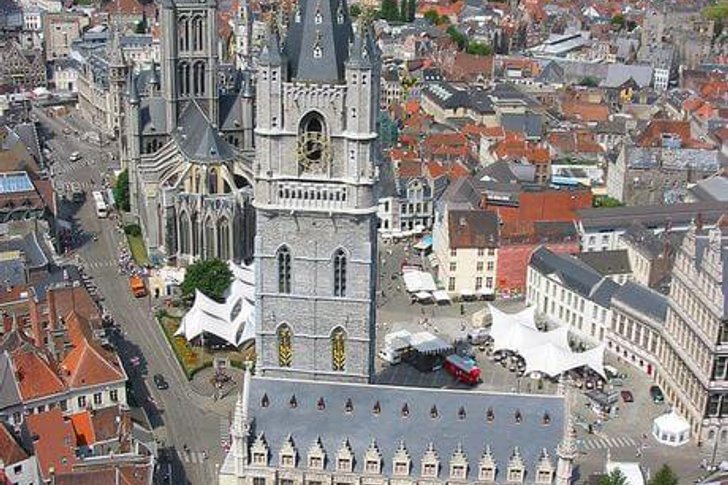
Address: Belfry Tower, Ghent, Belgium
Phone: +32 9 266 80 00
Opening hours: 10:00 - 18:00
Castle of the Counts of Flanders
An ancient powerful fortress of the XII century, one of the most visited attractions in Belgium. The building is perfectly preserved and has survived to this day. The rulers of Flanders used the castle as a defensive fortress, residence and mint. Inside the building there is a museum of weapons, where magnificent medieval swords, crossbows, daggers, armor, pistols are exhibited.
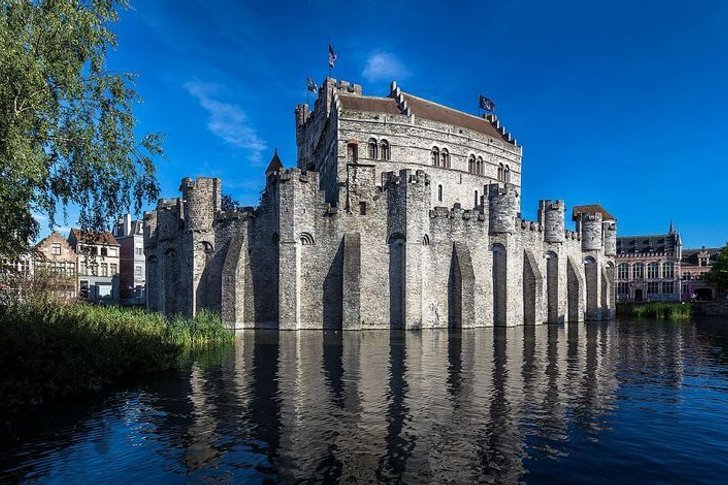
Address: Gravensteen Castle, Ghent, Belgium
Phone: +32 9 222 40 26
Opening hours: 10:00 - 18:00
Castle of Gerard the Devil
An ancient gloomy castle that belonged to one of the sons of the Ghent count. According to legend, this character killed several of his wives, for which he received the nickname "Devil". The complex was built in the 13th century in a monumental Romanesque style, but subsequently it was rebuilt several times, which is why the building acquired a later Gothic look. For centuries, the castle grounds housed a monastery, a lunatic asylum, an orphanage, a prison, and a city archive.
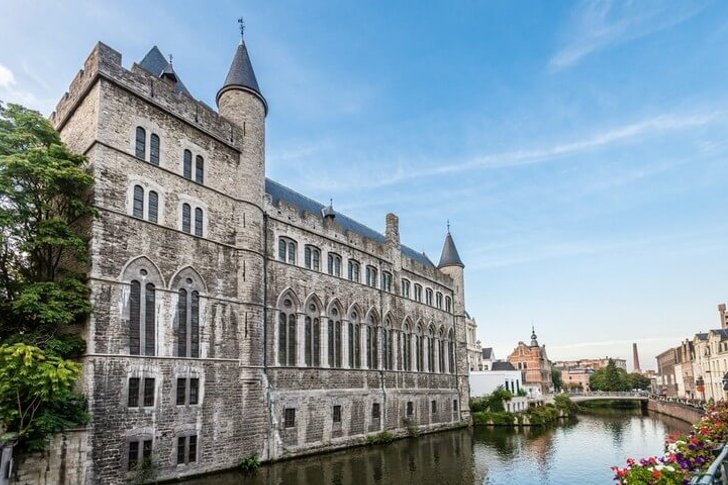
Address: Gerard the Devil's Castle, Ghent, Belgium
Cathedral of Saint Bavo
Ghent Cathedral, belonging to the Roman Catholic diocese. In the place of the current temple, there was a wooden church in the 10th century, later in the 11th century it was rebuilt in the Romanesque style, and from the 14th century in the Gothic style. The most famous relic of the temple is the Ghent Altarpiece, painted by the recognized masters of the early Flemish Renaissance - the Van Eyck brothers.
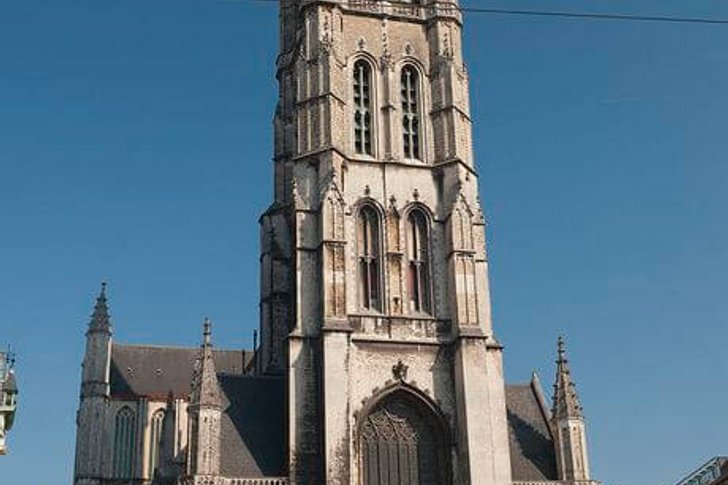
Address: St. Bavo's Cathedral, Ghent, Belgium
Phone: +32 9 225 70 00
Opening hours: 08:00 - 18:00
Church of St. Nicholas
The temple is one of the oldest religious buildings in Ghent. Its history began in the XII century. The predominant architectural style of the building is Schelde Gothic, which is distinguished by the use of a special type of blue-gray stone. The Church of St. Nicholas was owned by the powerful merchant guilds of Ghent. But this did not save her from partial destruction during the Iconoclastic uprising of 1566.
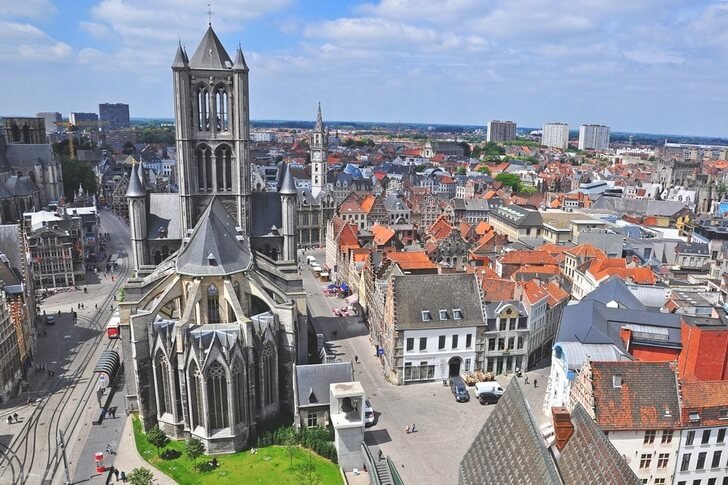
Address: St. Nicholas' Church, Ghent, Belgium
Phone: +32 9 233 74 27
Opening hours: 09:00 - 17:00
Church and Bridge of Saint Michael
Magnificent 15th century Gothic church, located in a quiet central area of Ghent. The temple was built over several centuries until 1828. Restoration was carried out after the First World War. The picturesque bridge of St. Michael leads from the church to the opposite side of the Lys River. It offers stunning views of the surrounding architectural splendor of the city's cathedrals, towers and medieval streets.
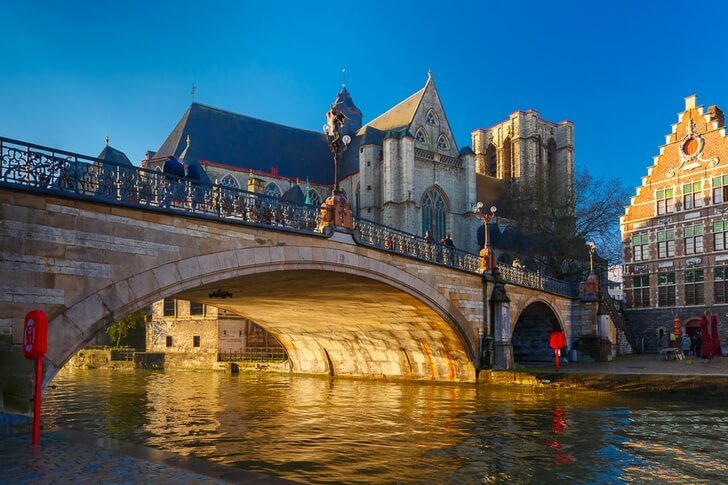
Address: St. Michael's Church and Bridge, Ghent, Belgium
Phone: +32 9 233 63 29
Opening hours: 09:00 - 18:00
Museum of Fine Arts
Museum with a rich and varied collection. It occupies a very worthy place in the galaxy of Belgian art galleries. The basis of the museum collection was made up of works of art confiscated from the Jesuit order and other religious associations. Later, many exhibits were taken by the French to Paris. Ghent has not yet managed to return an impressive part of the exposition. The museum opened to visitors in 1904, and after the First World War, it started operating in 1921.
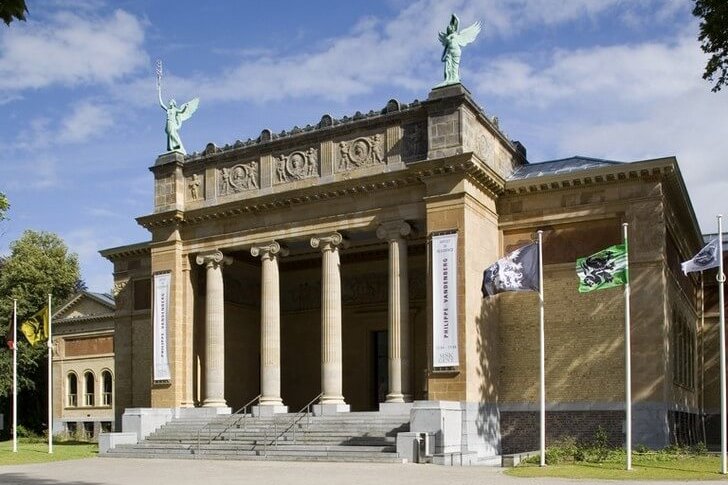
Address: Wolvengracht St, 9, Ghent, Belgium
Phone: +32 9 323 72 60
Opening hours: 10:00 - 17:00
City Museum of Modern Art (S.M.A.K.)
The museum was organized in 1999. He quickly gained popularity thanks to his bold provocative exhibitions and events. The permanent exhibition presents works by E. Warhol, F. Bacon, K. Appel, J. Beuys and other famous masters of our time. Temporary exhibitions are also often held on the territory, where exhibits are brought from other trendy contemporary art galleries.
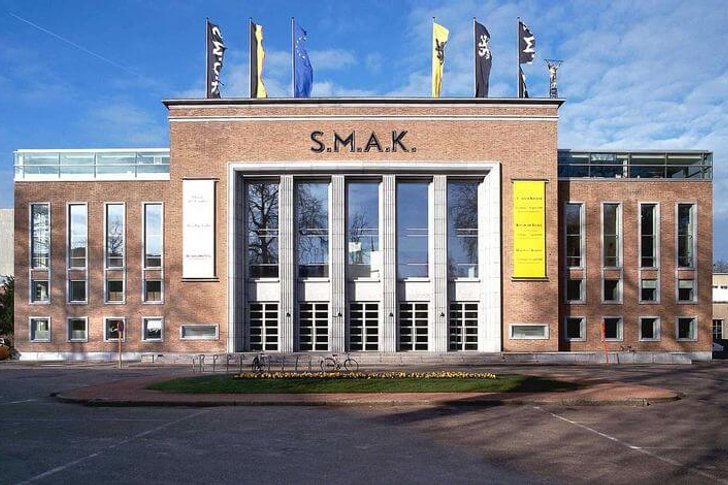
Address: Wolvengracht St, 6, Ghent, Belgium
Phone: +32 9 268 85 00
Opening hours: 10:00 - 18:00
Museum of Industry, Labor and Textiles
The museum collection occupies the building of a former textile factory located in the central part of Ghent. The exhibits tell about the history of the development of local industry since 1750. Most of the exposition is devoted to textiles, since Ghent already in the 18th century turned into a major center for the manufacture and processing of textiles. The museum exhibits looms, spinning wheels, machines and other equipment.
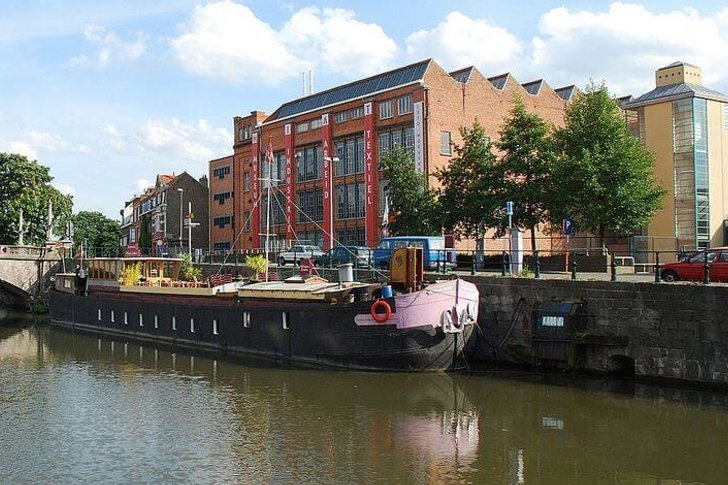
Address: Wolvengracht St, 15, Ghent, Belgium
Phone: +32 9 264 82 05
Opening hours: 10:00 - 17:00
Complex of protective structures Works
The complex is part of the city fortress wall of the 15th century. It consists of two round towers, a stepped façade located in the middle, and a bridge. After losing its defensive value, Rabot was used as an archive, tavern and warehouse. Today, the territory of the complex is used for meetings, lectures and seminars. Residents of Ghent call sights quite simply - "Three Towers".
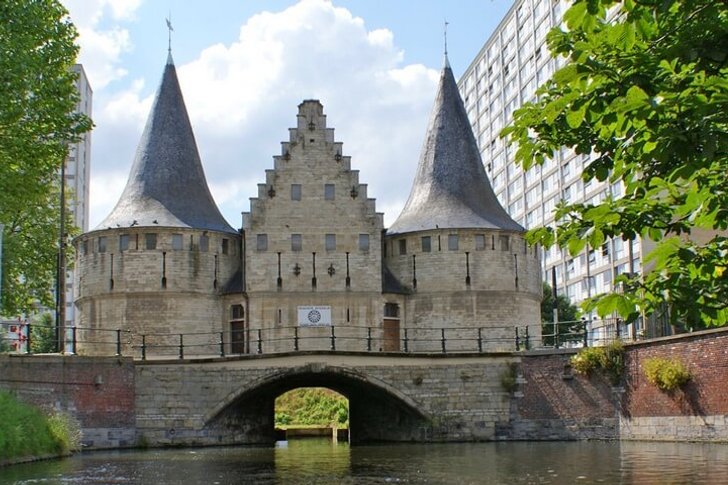
Address: Works Fortifications, Ghent, Belgium
Ghent-Sint-Peters station
Ghent's main railway station, which grew out of a small station. The modern building was built for the opening of the 1913 World's Fair. Trains depart from the station to all destinations within the country. The station is the second busiest in Belgium, so it is better to buy a ticket in advance, otherwise there is a risk of not getting on the right train. In 2007-2010 Ghent-Sint-Peters has been restored and updated.
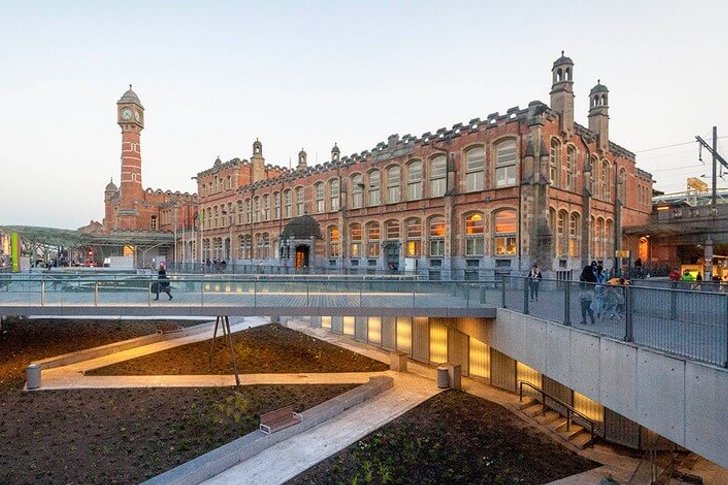
Address: Ghent-Sint-Pieters Station, Ghent, Belgium
Phone: +32 2 528 28 28
Opening hours: 24/7
Herb Street and Grain Street
Embankments of Ghent, located on the river Lys, which make up a harmonious architectural complex. Historical buildings of the 17th-19th centuries have been preserved here. - houses of merchant guilds, built in the style of the Flemish Renaissance, Brabant Gothic, Baroque and Neoclassical. Grass Street and Grain Street are popular places for tourists to walk. Restaurants with summer terraces are open in many houses. After a hearty dinner, you can take a boat ride.
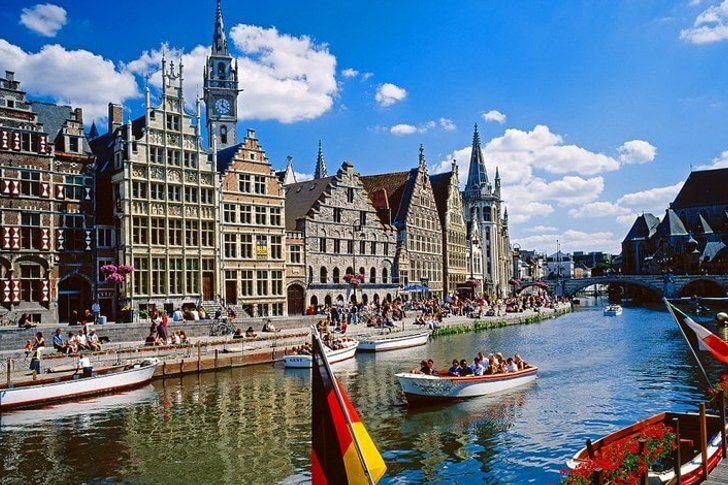
Address: Herb Street and Grain Street, Ghent, Belgium
Opening hours: 24/7
